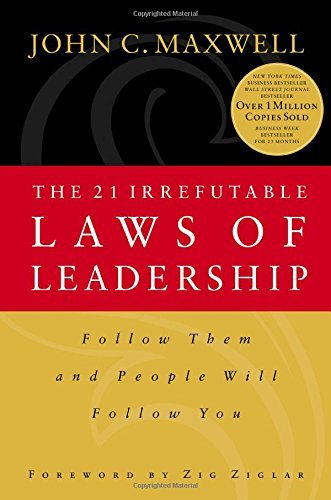
Our Book Summary
John C. Maxwell, in the book “The 21 Irrefutable Laws of Leadership”, offers the main leadership principles to anyone who desires to become a better leader. Powerful examples from the real world and many industries and cultures are provided for each law. Leadership, according to Maxwell, is not something one is born with, but rather a teachable set of skills. Such skills can be developed, sharpened, and exercised every single day. Discipline, service, and influence are required from the leaders. That can make a huge effective contribution to organizations, leaving behind legacies for times to come. This is a book full of practice-oriented wisdom. It is very relevant both for upcoming leaders and seasoned professionals. Learning and Mastering these 21 laws capacitates leaders to navigate the complexities of leadership. For you looking to grow in your leadership potential, Maxwell’s work is a must-read. It is a must for every professional library.
What to BUY this Book?
Book Outline
The book presents the 21 irrefutable laws of leadership, that any leader must follow:
The Law of the Lid
The leaders’s level of effectiveness determines leadership ability. As an example, the McDonald brothers epitomize how having limited leadership reduced their potential. On the other side, Ray Kroc’s enormous leadership ability has led McDonald’s to success
Law of Influence
True leaders are evaluated by how they can influence and not by titles or authority. Influence is the foundation of leadership. It means being able to inspire and motivate others to follow the leader. An example is what Abraham Lincoln did when he rose from a powerless captain to a president.
The Law of Process
Developing your leadership skills is a process. The story of Theodore Roosevelt’s transformation from a weak child into a strong leader is an example of daily discipline and continuous learning in leadership development.
The Law of Navigation
Anybody can drive the ship, but only a leader can initiate it. Good leaders prepare for the future, anticipate obstacles coming, and lead their people with skill through troubled waters.
Law of Addition
Leaders add value by helping others. To put it in other words, it means raising others up and making them succeed by creating value for people around them.
Law of Solid Ground
The foundation of leadership is trust. The leader can never establish or hold his leadership and successful relationships if he is not trusted.
Law of Respect
People will follow leaders who are stronger than themselves. Strength in leadership comes about by integrity, competence, and courage.
Law of Intuition
Leaders evaluate everything with a leadership inclination. Great leaders have an intuition of what is called for in any situation and act in accordance.
Law of Magnetism
Who you are is who you attract. Leaders attract people with the same values, skill sets, and level of leadership as them.
Law of Connection
Leaders touch a heart before they ask for a hand. If leaders are going to ask followers to open up and respond freely, then they have to have an emotional relationship with the followers in the first place.
Law of the Inner Circle
A leader’s potential is determined by those closest to him. One basic thing is that a good leader is surrounded by capable, trustworthy people who can help him succeed.
The Law of Empowerment
Only secure leaders can empower others. By empowering others, you will strengthen the organization and produce a motivated team and future leaders.
Law of the Picture
People do what they see. Leaders act as role models with the expected behavior of others.
Law of Buy-In
People follow leaders before they follow the vision. For people to support the vision, credibility, and integrity of the leader are things very critical.
Law of Victory
Leaders lead their teams to win. Real leaders are committed to winning and will make whatever sacrifices to make their team successful.
Law of the Big Momentum
Momentum is a leader’s best tool. Leaders know how to create and sustain momentum, moving their teams toward success.
The Law of Priorities
Leaders know that activity does not necessarily mean achievement. Leaders prioritize very effectively, making sure that the important goals are met.
The Law of Sacrifice
Leaders know they must give up to go up. Leadership success is often secured by personal sacrifice for the greater good.
The Law of Timing
When to lead is equally important as what to do and where to go. Good timing can be the difference between success and failure in leadership.
The Law of Explosive Growth
If you would like to multiply growth, lead leaders. This creates exponential growth by developing leaders within the organization.
Law of Legacy
A leader’s value is measured by developing other leaders. The real test of leadership is what’s left after they’re gone. Is the leader enabling the organization to be better off when they are gone?
What to BUY this Book?
